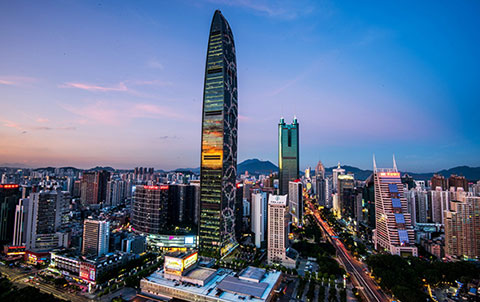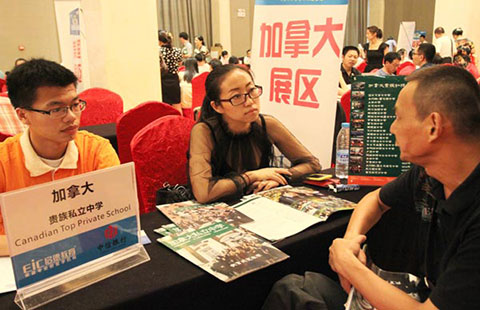Chinese doing business in the US need to do their homework
Updated: 2015-07-28 09:31
By Chang Jun(China Daily USA)
|
||||||||
 Chinese companies that do - or want to do - business in the US can benefit with a little friendly reminder: assimilation and adaptation to the local business culture is critical. You could even call it the "make or break" rule.
Chinese companies that do - or want to do - business in the US can benefit with a little friendly reminder: assimilation and adaptation to the local business culture is critical. You could even call it the "make or break" rule.
At a seminar on Friday at Stanford University, a dozen or so Chinese businessmen were bombarded over and over again with the same word - localization - by a panel of government officials, scholars and industry insiders.
"I don't want to exaggerate the importance of localization," said moderator Stanley Kwong, who teaches globalization strategies at the School of Management at the University of San Francisco, "but as soon as you set foot on American soil, you have to learn to survive and thrive in an alien business culture."
The world's two largest economies remain active in a wide-spectrum of exchange and communication. In 2013, for the first time China's investment in the US, $14 billion, outpaced US investment into China. America received $12 billion in investment from China in 2014, still enough to make the US the No 1 destination country for Chinese outward investment.
US-China bilateral trade volume hit a record high of $590 billion in 2014 with California being the recipient of more than 25 percent of China's direct investment in the US.
In recent years, "the momentum remains very strong between China and the US in the fields of real estate, aviation, education and tourism", said Xia Xiang, economic and commercial counselor of the Chinese Consulate General in San Francisco.
Xia has also noticed that more and more Chinese companies are coming to the US to seek growth opportunities, their mission being to grow their name internationally and seek innovation capabilities to upgrade their offerings and move up the value chain.
It's not an easy job for Chinese companies to increase their brand awareness and product recognition in the developed world, where Western brands are dug in and have already clinched controlling market shares.
Making it harder still, insufficient knowledge of the local business culture and industry rules and regulations usually end up being the two biggest hurdles to growth and expansion for Chinese enterprises in the US.
Most difficulties faced by the Chinese companies in the US are related to commercial factors, said Kwong, adding the problem is immediate and pressing, as many companies are involved in purchasing, acquisition and other forms of business development across industry sectors.
"We always advise the newcomers of Chinese enterprises that the first thing for them to do is find good professionals," said Xia. "Be it a law firm, a tax firm or a business partner."
In Silicon Valley, several Chinese companies have launched branches, specialty research centers established by Huawei Technologies, ZTE Corp, TCL, China Telecom, China Mobile and China Unicom.
"They all need to solve the problem of adaptation and act as a local company," said Xia.
Brad Bao, managing partner of Fosun Kinzon Capital and former supervisor of Tencent's US operations, said he insisted on promoting a business culture of "think global and execute local" during his stint at the Chinese high-tech giant.
"Without a localized approach, we cannot walk further," Bao said, noting that he was the only Chinese-background employee on the management team in Tencent's Silicon Valley office.
Patrick Duan, vice-president of operations at BYD America Corp, which produces electric vehicles, admitted his company had walked a crooked road in the US due to a lack of knowledge about business culture and industry regulations.
"It took several years and much patience for us to finally adapt to the environment and start a smooth conversation with policy-makers and partners around here," Duan said.
Contact the writer at junechang@chinadailyusa.com.
- IS likely uses mustard agent in Iraq attack
- Fidel Castro marks 89th birthday with surprise visit
- Switzerland begins public consultations on joining China-led AIIB
- Malaysia seeks increased trade ties with China
- China salutes veterans of anti-Japanese aggression war
- 5 Japanese ex-PMs show concerns over security bills

 Times Square 'Kiss-In'
Times Square 'Kiss-In'
 School turns into place of shelter in Tianjin
School turns into place of shelter in Tianjin
 Earliest site of coal fuel found in Xinjiang
Earliest site of coal fuel found in Xinjiang
 Top 10 Chinese cities with highest property prices
Top 10 Chinese cities with highest property prices
 Comfort women: Scars have not been healed
Comfort women: Scars have not been healed
 Top 10 places to visit in Tibet
Top 10 places to visit in Tibet
 8 groups yuan depreciation will impact most
8 groups yuan depreciation will impact most-
 Historic kiss on grand scale
Historic kiss on grand scale
Most Viewed
Editor's Picks

|

|

|

|

|

|
Today's Top News
China, US engage in human rights
China investigates Tianjin blasts, experts focus on chemicals
PBOC promises effective steps for yuan stability
US oil slides to six-and-a-half year low under $42 as stocks build
US believes IS likely uses mustard agent in Iraq attack
12 firefighters among 44 killed in Tianjin explosions
Hacking blame a US power play: experts
Alibaba falls behind Amazon
US Weekly

|

|






